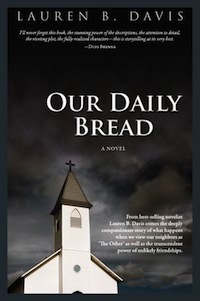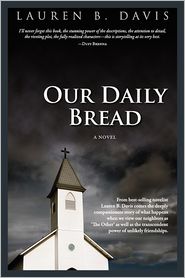Sin and Sustenance
Lauren B. Davis' thrilling, polyphonic new novel, “Our Daily Bread,” takes us into a backwoods clan rife with child abuse and incest, and asks the question: "When does another person's suffering become my responsibility?"
“Our Daily Bread”
A book by Lauren B. Davis
In her thrilling, polyphonic backwoods novel, “Our Daily Bread,” Lauren B. Davis directs her unflinching gaze at a tumbledown world of the marginalized poor, evoking the injustice of that world with a raw immediacy that simultaneously attracts and repels. On the first page she sounds a frightening motif: “Satan draws the soul to sin by choosing wicked company.” So begins the first of the fire and brimstone sermons, spanning 1794 to 2009, which punctuate the narrative. These homilies chart the ferocious power of an unforgiving religion in Davis’ fictional town of Gideon, a religion that defines our time on earth as a life and death struggle between the righteous and the damned.
We first meet the sinewy, mysterious Albert Erskine, gently planting marijuana seeds in a sprouting box high up on North Mountain, a rugged region inhabited only by dirt-poor mountain folk. When Albert’s uncles catch him spying on their filthy meth lab, they beat him, humiliate him, and we are instantly invested in this young man struggling to grow without a shred of love or respect.
Later he articulates the Erskine code to young Bobby Evans, a townie teen who sees a virile role model in Albert: “You keep your secrets to yourself and you keep your weaknesses a secret and your hurts a secret and your dreams you bury double deep.” This code is a recipe for disaster, disavowing the human need for trust and connection, but it makes perfect sense as the bedrock foundation of a victim of repeated incestuous child abuse.
“Our Daily Bread” was inspired by Davis’ memories of living in Nova Scotia in the early 1970s and hearing grisly, titillating stories about the Goler Clan who inhabited South Mountain. These tales were rife with incest, babies buried on the mountain, child abuse and other crimes. Later Davis read “On South Mountain: The Dark Secrets of the Goler Clan” by David Cruise and Alison Griffiths, a journalistic account of the arrest, investigation, trial and sentencing of almost an entire generation of one clan for incest and child abuse. She realized the sickening stories had been true, but no one ever did anything about them because the perpetrators and victims were just “mountain.”
So began an ethical question that drives this unforgettable novel: When does the private suffering of others become your business? This is a question that not only Albert Erskine, but also the other memorable characters in “Our Daily Bread” must address. With consummate control and an almost musical sense of when to shift from one story line to another, Davis filters the action through the eyes of Albert Erskine, Dorothy Carlisle, Tom Evans and Ivy Evans. She intercuts her narrative, jumping from one character’s perspective to another, so that the reader accumulates more knowledge than any one of the protagonists. Just as Albert creates tension within the Erskine clan by refusing to conform, Dorothy Carlisle, a 62-year-old widow who runs an antique shop, can’t help but feel compassion for the indigent, disadvantaged clan children. For years she has been anonymously dropping boxes of clothing and food on the mountain, even leaving books especially intended for Albert. Dorothy, unlike Albert, believes that an elegant life is “lived by immersion in the quotidian, by honoring creation with awareness.”
This renders Dorothy an ideal refuge for Ivy Evans, a young girl who is cruelly bullied by schoolmates. Ivy finds solace from her mother’s cold indifference in Dorothy’s company.
Of the four protagonists, Tom Evans, Ivy’s father, a bread delivery man hopelessly in love with his aloof wife, Patty, seems the most leadenly resistant to change. Ivy has a clearer view of her mother’s refusal to participate in the family than her father does. “Mom’s always afraid people don’t love her enough,” Ivy says. Tom’s own denial of the unhappiness of his marriage is so entrenched that the events of the story will have to crush him before he will wake up and take responsibility for his life and that of his children.
Late in the novel on one grim night Dorothy witnesses a naked child screaming on the mountain, a sight so baleful she evokes the Confiteor, the prayer of contrition, for protection. Dorothy asks herself: “What had she seen? What had she done? What had she not done?” And Davis supplies Dorothy’s prayer: “Oh God, we confess we have sinned against thee in thought, word, and deed, by what we have done, and by what we have left undone.” We are struck by the terrifying thought that what we have left undone is the most heinous crime of all.
“Our Daily Bread,” which takes its title from the passage in the Lord’s Prayer referring to daily sustenance as opposed to religious ostentation, raises the question: What do we need every day to survive? “Daily Bread” is not just what you are entitled to, but what you give, every day, to yourself and others. How do you lead a responsible life? When do people learn that what they want, or think they want, is not what they need?
It’s difficult to write about the beauty of Davis’ storytelling without revealing too much. Suffice it to say that she seeks to unfold consciousness, including the reader’s. Davis makes us care about her characters. Whether it is a clubfooted girl balancing on an overturned bucket to glimpse what is going on in the house or the trial in which the children must testify to the horrors done to them, these shocking moments rooted in reality are imaginatively transformed by Davis’ exquisite prose. Her sense of place, gift for visualization and ear for interior monologue combine to propel us through this savage landscape and the roiling emotional journeys within.
Davis is a cinematic storyteller, but the brilliance of “Our Daily Bread” lies also in what she refuses to show and will never tell. Her moral fiction calls us to empathize, read, imagine and hear, not only what is said, but the unsaid as well. This is a story of getting lost in the woods, of meeting the monster and getting out alive. Davis never takes us inside the house where all these perversions are committed; we only see defenseless children entering, exiting and spying in at the window. She strategically balances the quotidian against the grotesque, calm against menace, quiet against violent, until, of course, all roads lead to the top of the mountain where all hell breaks loose. High on meth and even more paranoid, “The Others” — the children’s name for the abusive adult members of their clan — are having a Saturday night blowout. Albert has brought Bobby Evans to see where he lives, a transgression strictly proscribed by the clan. The rest of the Erskine children, pressed to the breaking point by the meth-fueled abuse, turn to their big brother Albert to stand up for them in their fight to survive. The page-turner climax that Davis delivers, detonating the intersecting plotlines into an apocalyptic ball of fire, will make your hair stand on end.
Canadian-born Davis doesn’t locate Gideon geographically. It could be anywhere in North America where there are mountains and a culture that thrives on shunning pariahs. Meth labs have sprouted up all over the United States and the prevalence of an intolerant “us and them” philosophy, religious or secular, has only ballooned in the age of terrorism. Davis’ characters are outsiders all, excluded from the ordinary web of nurturing relationships, yet somehow through their ability to sense unspoken needs and through acts of compassion, they are able to come to one another’s assistance in unexpected ways.
Davis closes with a final image of ashes scattered and then spiraling in an updraft off the waters of Nantucket. It is an image of flight, of freedom. It has come at the expense of a life. But what is truly startling about this journey is that it is made not just by one, but by all of Davis’ homespun warriors. A tormented, once silenced soul rises, perhaps irrevocably free.
Jean Randich is a director who has been staging new plays, political and musical theater, as well as reimagining the classics for more than 20 years. Randich has received an NEA/TCG director fellowship, a Fox Foundation grant and a Jonathan Larson Performing Arts grant. She has an MFA from Brown University and a master’s degree from the Yale School of Drama. Randich teaches at Bennington College and NYU.
Your support matters…Independent journalism is under threat and overshadowed by heavily funded mainstream media.
You can help level the playing field. Become a member.
Your tax-deductible contribution keeps us digging beneath the headlines to give you thought-provoking, investigative reporting and analysis that unearths what's really happening- without compromise.
Give today to support our courageous, independent journalists.







You need to be a supporter to comment.
There are currently no responses to this article.
Be the first to respond.